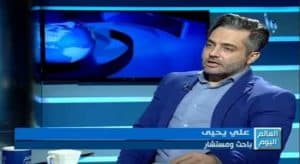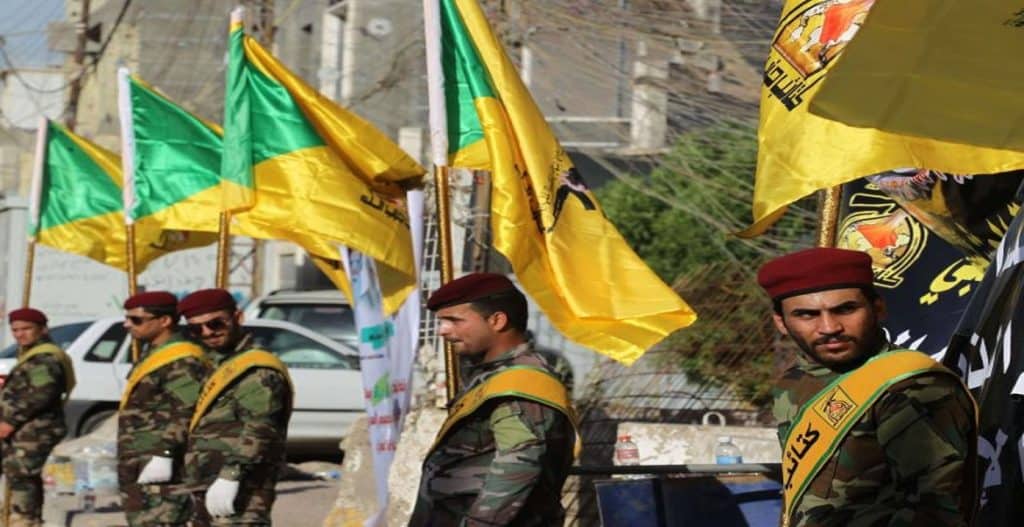Most military conflicts in the Middle East are still being carried out with the direct participation of the Lebanese armed group Hezbollah. Since its inception, this movement under the leadership of Hassan Nasrallah has been the main military-political center, which affects virtually all international processes, where military pressure on certain countries and near-state formations is likely to apply.

About this, exclusively for “World Geostrategic Insights”, Denis Korkodinov talked with a leading Lebanese political scientist and specialist in the field of transnational challenges: Ali Yehya (Beirut).
1. On July 1, 2019, Iraqi Prime Minister Adil Abdul Mahdi officially launched an initiative to reform the Hashd al-Shaabi movement, which maintains close contacts with Iran. Thus, according to the reform, Hashd al-Shaabi should leave the territory of Nineveh, Salah al-Din, Kirkuk and concentrate in the vicinity of the Iraqi capital. According to experts, such a legislative initiative of official Baghdad was caused by the discontent of American politicians that Hashd ash-Shaabi could side with Tehran in the event of an escalation of the US-Iran conflict. It is worth noting that fears from the United States are caused not only by the Iraqi militia, but also by the Lebanese Hezbollah grouping, which also has fairly strong relations with the ayatollah regime. In this regard, the logical question is whether the White House’s administration, as a result of waiting for the Iranian threat to exert pressure on Beirut, is analogous to Baghdad in order to achieve the redeployment of Hezbollah troops to remote areas and weaken Iran’s influence on them? If this scenario is implemented, will the Hezbollah leadership comply with the requirements of the official government of Beirut?
– Maximum US political pressure in Lebanon could be achieved in a 2006 ceasefire agreement after the “July” war, which aimed to liberate the area between the Blue Line and the Litani River, free of any armed forces, weapons and weapons, except for armed Lebanon forces and international peacekeepers.
Washington also called for the full implementation of the provisions of the Taif agreements and UN Security Council resolutions 1559 and 1680 on the demilitarization of all Lebanese groups and their redeployment to areas under the control of official Beirut.
This means taking Hezbollah units north of the Litani River further from the Lebanese-Palestinian border. In turn, such an initiative prompted Hezbollah’s leadership to secretly build the infrastructure and network of tunnels described in a study prepared by the Israeli military after the 2006 war, when the Israeli armed forces first discovered that it was impossible to confront an enemy who was present simultaneously in two areas, land and underground.
During the 2018 elections, Hezbollah and its allies for the first time won more than half of the seats in parliament, which allowed them to become the most influential parliamentary and governmental political force. This would prevent the United States from achieving new resolutions and, therefore, resorting to economic pressure and intimidation. Hezbollah has two deputies in the Lebanese parliament, namely Mohammad Raad and Amin Sri, as well as an employee of the Hezbollah communications department for internal coordination and communication.
2. On June 1, 2019, Hezbollah’s head Hassan Nasrallah publicly expressed an ultimatum to Washington, according to which, in the event of increased pressure on Iran, “any American forces and American interests would be acceptable” as a target. Does this mean that Hezbollah is considering the possibility of military participation in the confrontation between the White House administration and the ayatollah regime? What American goals for Hezbollah can be priorities and is it possible to assert that the expected actions of Hezbollah in relation to the American object and interests can be coordinated, even if secretly, with the leadership of official Beirut?
– The confrontation between Hezbollah and the Revolutionary Guard, controlled by Beirut, on the one hand, and the American troops, on the other, has not stopped even once the party appeared. The US accused Hezbollah of blowing up two buildings with American and French soldiers in Beirut on October 23, 1983, and a terrorist attack in the US Embassy in Ain al-Murais, where 70 people were killed, almost all of whom were employees of a local station CIA.
In addition, Washington accused Hezbollah of training Asaib Al-Haq’s brigades, which, according to reports by Crocker Petraeus and US intelligence, have experience in conducting sabotage acts deep in the back of the enemy. These groups, according to General Petraeus, are responsible for 85% of the attacks on US forces in 2008.
And thus, through experience, will and ability, as well as a network of alliances in the geographic range from Lebanon to Palestine, Bosnia, Syria and Iraq, allow Hezbollah to be an active element in any future axis confrontation where an attack on US forces can be intensified. . Through the Haqqani network in Afghanistan (Pashtuns and other Hazara groups) and targeting US forces in Iraq, Hezbollah can cause an irreparable blow.
3. Not so long ago, Israel’s Energy Minister Yuval Steinitz stated that Lebanon was not ready to agree to the US mediation role in the process of establishing the sea border, suggesting that Hezbollah, supported by Iran, was putting pressure on Beirut. In this regard, is it true that the only obstacle to the establishment of the sea border between Israel and Lebanon is the position of Iran or are there any other obstacles preventing the parties from reaching a compromise?
– The dispute arose because of the delimitation of the sea border of a triangle with a width of 860 km in the Mediterranean, in which Israel occupies 13 occupied Lebanese points. Tel Aviv opposes the participation of the UN, in connection with which he did not sign the Convention on the demarcation of the international border.
The Israeli leadership has offered Lebanon to withdraw 45 percent of the border triangle area. However, the Lebanese government considers it their legal right to have a large territory within the triangle located off the Lebanese coast. Although Beirut agreed to organize negotiations mediated by the United States through Ambassador David Satterfield, who received an Israeli letter.
However, Israel still resists. There is a Lebanese position of parties and influential parliamentary blocs regarding the demarcation of borders. They insist on not giving up what is a legal right for Lebanon. The recent decision of the Lebanese army to build an observation post on the border between near Naqoura to the south of Lebanon in exchange for an Israeli observation post did not solve the problem. The above confirms the Lebanese initiative to demarcate borders without any outside influence from Iran or other countries.
4. Returning to the recent topic of the attempted coup d’état in Venezuela with the participation of Juan Guaido, Leopold Lopez, Maria Corino Machado and their team, it is worth noting that Hezbollah closely followed the development of events, since the movement is widely represented in the Bolivarian Republic. In addition, a number of international analysts seriously considered the likelihood of Hezbollah’s active military participation in support of Venezuelan President Nicolas Maduro. Is it legitimate to assume that in the event of the seizure of power in Caracas by Juan Guaido, Lebanon could launch a full-scale military campaign in the region in order to restore the legitimate authority of the president of Venezuela? Did Hassan Nasrallah and his circle consider the possibility of military resistance of the Venezuelan opposition?
– Hezbollah’s intervention in foreign affairs depends on many criteria and control measures raised by the legitimate mandate, as well as the participation of the militants in the 8-year war with Iran and their participation in the Bosnian conflict. Hezbollah’s intervention was in Iraq. In particular, the movement sent training personnel to Baghdad and contributed to the planning of specific operations (the operation in Karbala, as a result of which five American soldiers were captured and killed). Among other things, there was intervention in Syria and Yemen.
However, the situation in Venezuela so far does not require the participation of Hezbollah. Venezuelans do not need military mercenaries, because they have their own chavista units. In addition, Caracas receives assistance from Russia and Cuba.
Image Credit: thearabweekly.com/AFP







